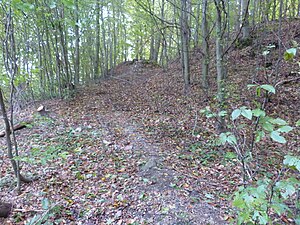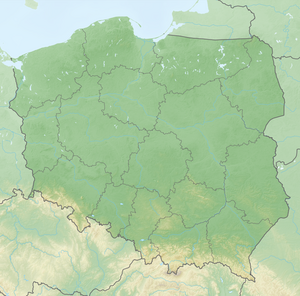Poplow Castle
| Poplow Castle | ||
|---|---|---|
|
Castle hill, general view |
||
| Creation time : | Medieval | |
| Castle type : | Hilltop castle | |
| Standing position : | Noble | |
| Place: | Popielewo | |
| Geographical location | 53 ° 42 '52.9 " N , 16 ° 9' 56.2" E | |
| Height: | 220 m above sea level NHN | |
|
|
||
The castle Poplow is a former medieval castle in Popielewo ( Poplow ) within Świdwin County of Polish West Pomeranian Voivodeship .
location
The former hilltop castle was located in a wooded area on the former Räubersberg , about 3.7 km south of Popielewo and 11 km southwest of Połczyn-Zdrój , in the immediate vicinity of a lake. It was built as a hillside castle in what is now the area of the municipality of Połczyn-Zdrój (German Bad Polzin ), in what is known as Pomeranian Switzerland , on the border with what will later become the district of Neustettin.
history
The Manteuffel family , who were mentioned as owners of Polpow as early as the late Middle Ages (1430; Erich von Manteuffel, Ritter auf Poplow, Kollatz , Buslar and Quisbernow ) can be assumed to be the builders of the castle . Tradition cites the Knights of Queeren as the owner of Poplow, which is, as it were, the Manteuffel family (also Mandeuffel, Mandu / ü | v / f / w | el, Mandiv / w / el, Manduuel), who refer to sources Result also from Queren or Querne called Note 1 .
The time of construction is unknown, but the building is dubbed a medieval castle. In 1449, in the presence of Nicolaus von Manteuffel, Mayor of Schlawe , the Manteuffel received a letter from Duchess Maria von Stolp , in which the castle in Popielewo was awarded to them as a fief. It is known that the castle was built in 1530 or 1531 (according to other sources, 1532) by the Pomeranian Duke Barnim IX. was captured and set on fire because its residents were robber barons and had driven their trade too badly and had even extended their raids to Prenzlau in the Uckermark . Years before, family members had already raged in the Deutsch Krone Castle : In 1527 Hans Zarte, Fritz and Joachim von Manteuffel-Popielewski were accused of robbery, in late autumn 1531 the castle was destroyed and burned down. On June 3, 1532 David Manteuffel and his uncle Joachim died at the hands of the hangman in Deutsch Krone. Gerd von Manteuffel, who together with Bogislaw X. , Barnim's father, moved to Jerusalem via Venice and Padua in 1496 , was feared at the time because of highway robberies. This conflict led to the Pomeranian Duke being confiscated from the Pomeranian Duke for a time; In 1549 family members are again listed as owners of Poplow (Heinrich von Manteuffel, Oberhofmarschall and Electoral Palatinate Council).
Folk tales tell of the ingestion:
“The Manteuffels on Poppelow were particularly predatory and terrible in 1531, under the reign of Duke Barnim IX. They had trained large dogs, which announced every approaching stranger from afar, so that no one could escape their robberies, and no person and no street was safe from their raids and looting. Duke Barnim, therefore, after having taken office for a while, conferred with the Bishop of Cammin and Count of Eberstein on how to destroy them, and it was agreed to attack them from all sides on a certain day, and with them do not want to escape, the day was announced to the neighboring princes in Brandenburg , Mecklenburg and Poland , and they were asked to guard their borders and seize the fleeing robbers. On the appointed day the Duke and his family marched in front of Popplow to catch the robbers. But the Manteuffel not only relied on the watchfulness of their dogs, but they also had a sister who loved their brothers very much, and who therefore used to sit all day on the high tower of the castle to see enemies, and the brothers to warn of an attack. Even at times she saw the approaching duke, and warned her brothers that they would flee across a lake into a ravine and escaped happily (note: to the cousins in Poland). Poppelow Castle was then taken and completely burned and destroyed. The Duke himself started a kitchen fire and set fire to the house with all the looted goods in it. Then the sister and the old mother of Manteuffel complained, who had not been able to escape with her sons, and the latter said as if she had been very right: God be sorry, my children are not allowed to have their belongings and property You have dared your life and limb so often. "
Other sources report:
“[...] About the more detailed circumstances of this incident and the further fate of Ritter v. Queeren has the following message in the mouths of the people: When Erich (?) Approached the castle, the ruins of which are still called the Räuberberg and the manor farm nearby, they escaped early, through the sister of von, who was peeping on the tower of the danger that the seven Brothers v. Queeren with their old frail father, leaving their mother and sister behind on a boat across the deep and romantically situated lake at the foot of the castle [...], but the father drowned and came through the forest undetected Kölpin near Greifenberg , where they owned a second castle. "
“[...] So Duke Barnim only caught a Manteuffel and a Wodtke and several farmers, active robbers of their landlords. He broke both Poplow into the ground, including the one on Polish soil, hauled the goods in and took them to the court in Stettin, only allowing the young women to go. The rear seat of the v. Manteuffel, formerly mindless farmers, had become so wise to "knock off" their masters when they returned to their farms. "
Description of the plant
In his chronicle from 1862, Werner Reinhold describes the complex as being five miles south of Groß Poplow, as a high-altitude, heavily fortified castle, of which the ramparts and courtyard walls with three gates can be clearly seen .
The complex was probably built as a so-called tower hill castle on a natural hill. Since the castle was destroyed, the remains have remained untouched for centuries. At the beginning of the 20th century, only a few remains of the massive foundation were recognizable, including a narrow, steep stone staircase down to the lake, a collapsed fountain and the location of the former keep .
Up to the present day, the hill clearly shows traces of artificial processing: the former access (with wall remains made of boulders) as well as piled-up walls , partly reinforced with boulders, can still be seen today.
See also
Remarks
literature
- Georg Schmidt: The von Manteuffel family. Poplow tribe of the Pomeranian ancestry. Berlin 1913.
- Werner Reinhold : Chronicle of the cities of Belgard, Polzin and Schivelbein and the villages belonging to the two districts. Schivelbein 1862, page 192 f.
- Jodocus Donatus, Hubertus Temme: The folk tales of Pomerania and Rügen. 1840 ( online ).
- Friedrich Wilhelm Barthold : History of Rügen and Pomerania. Volume 4, Part 2, 1845 ( online ).
- Supplement to: Zbigniew Radacki: Medieval Castles Pomerania , Warsaw 1976 ( online ).
- Nicolaus von Klemptzen : From the Pommerlande and its princes gender description. 1771, p. 261 ff ( online ).
Web links
Footnotes
- ↑ a b c d G. Vietzke in: Our Pommerland. Special issue of the Belgard district, issue 11/12 1929.
- ^ F. Voight: New general German nobility lexicon: in association with several historians. Volume 6, 1865 ( online )
- ↑ Związek Miast and Gmin Dorzecza Parsęty. Pomeranian Family Tour Guide parseta.org.pl (PDF; 9.3 MB, German). P. 36.
- ↑ Dictionary network: Rhenish dictionary ( online )
- ↑ Jürgen Udolph : onenological studies on the German problem. Verlag de Gruyter, 1994, p. 574 ( online )
- ↑ Prūsų kalbos paveldo duomenų bazė - Paieška: mandiwelis ( online )
- ^ Thesaurus of Indo-European Text and Language Materials (TITUS): Old-Prussian Corpus: Part No. 7. ( online )










